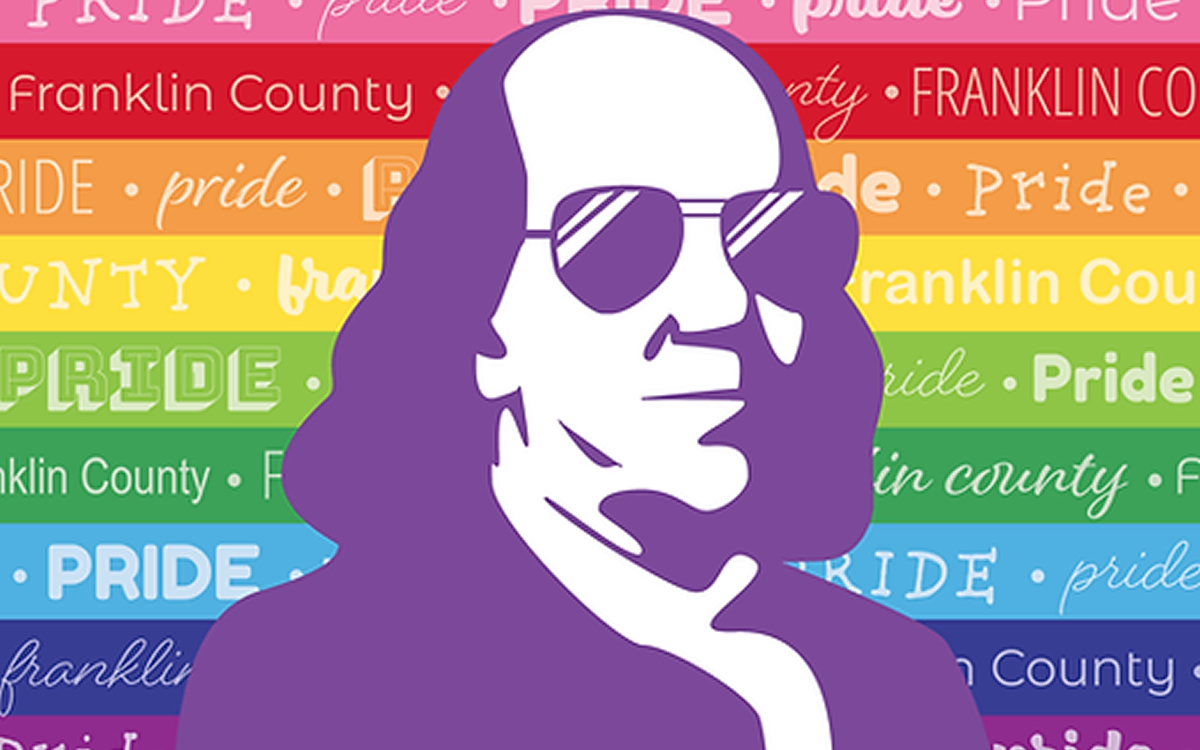Pennsylvania
Pride Franklin County welcomes rural LGBTQ community
Pennsylvania organization planning October celebration

When Pride Franklin County held its first Pride celebration in 2018, it sought to address a lack of LGBTQ programming in rural southern Pennsylvania. Greeted by more than 1,000 attendees at its inaugural event, Pride Franklin County’s leadership was reassured the event was something the area not only wanted, but needed. Since the onset of the COVID-19 pandemic, the local organization has once again sought to address community needs — in new and broadened ways.
Pride Franklin County operates under the Franklin County Coalition for Progress, a local social justice nonprofit that formed in the wake of the 2016 presidential election. “We live in a very rural, conservative area, but that election was a turning point all across the country,” explained Noel Purdy, a founder of Pride Franklin County and founder and president of FCCP.
“People came out of the woodwork who were worried about the LGBTQ community … and other populations that had experienced different forms of oppression in our community,” Purdy explained. This interest in supporting the local LGBTQ community led to a group of LGBTQ community members and allies leading the 2018 Pride celebration.
“We just really wanted to create a space where people know that they’re accepted, no matter who they are,” said Nathan Strayer, vice president of FCCP and a founder of Pride Franklin County. “We want people to know that you fit in. There are a lot of people here that are going to love you.”
But in 2020, at the peak of the event’s popularity — Strayer noted that upwards of 3,000 people attended Pride the year prior — Pride Franklin County had to cancel its programming in light of public health concerns.
With the “momentum” it has going, Strayer explained that the organization did not want the pandemic to limit its ability to serve the Franklin County community: “ That’s when we really decided to make the entire initiative something bigger,” he said. “We’re not just here to throw a party.”
In 2021, the organization began advocating for a local non-discrimination ordinance codifying inclusivity for all community members, regardless of their identity. The Borough of Chambersburg Council, which represents the largest borough in the county, adopted the ordinance that fall — a major win for LGBTQ activists and allies in a rural Pennsylvania county that leans conservative socially and politically.
Yet, just months after the organization celebrated its achievement, new council members were elected in the borough in January 2022, and soon thereafter a majority of the council decided to repeal the non-discrimination ordinance.
While the ordinance’s revocation greatly disappointed Pride Franklin County, it also reminded its leaders and activists how much work was left to be done.
“From the growth of Pride to the pushback we’ve gotten from some of our elected officials here locally, it’s definitely lit a fire in us to continue pushing ahead so that we can truly make Franklin County an inclusive place for everyone,” Strayer emphasized.
This year, the organization launched its Franklin County Welcoming Project, which spearheads public displays of support to the LGBTQ community. In June, the organization received a media grant to create billboard and radio advertisements throughout the county advocating for inclusivity within the Franklin County community.
The organization also reached out to local businesses, providing them with custom decals to put in their windows after signing a pledge stating that they are a “diverse, inclusive, accepting, welcoming, safe space for all,” Strayer said, adding that, despite some initial hesitation, more than 100 local businesses signed the pledge and displayed the logo in their storefronts.
Pride Franklin County has also looked to meet the local demand for LGBTQ programming throughout the year while maintaining public health precautions. More recent projects have included mental health LGBTQ programming, community picnics, drag shows and a Taste of Pride food event. Strayer added that there has been significant demand from the community for more programming centering LGBTQ youth.
Purdy added that voting rights advocacy has become a center point of current efforts from the organization, as it hopes to educate the local community on the importance of their political involvement. “Hopefully, we’re inspiring more people to learn to pay attention more to what’s going on, and trying to understand the connection between policy and voting,” Purdy explained
While the process of founding a grassroots organization has come with obstacles, Purdy and Strayer both noted that the community response has been rewarding.
“One thing that I’ve been surprised about is how you have this cultural context of being in a conservative area, thinking that that’s going to be a barrier to doing an event that supports the LGBTQ community, and that it’s going to be super controversial,” but ultimately receiving a positive reception from many community members and resources needed to keep the organization running, Purdy explained.
Getting Pride Franklin County up and running has “definitely been very emotional,” Strayer noted. When Strayer decided to come out in 1999, he turned to leaders in his school — a guidance counselor and principal — for advice, but he recalled them “both sitting down and looking at (him) like, ‘We don’t really know what to do,’” making him feel alone in a particularly important part of his life. But with Pride Franklin County, Strayer is “seeing how things are growing and changing.”
“There’s help out there for youth that are struggling with the same things I was struggling with,” Strayer said. “When I look back at when I was coming out, I thought, ‘This is never going to happen here.’ Seeing now that it is happening here, it’s just such an amazing feeling and it just gives me so much pride in my community.”
Pride Franklin County will host its Pride Festival 2022 on Oct. 9 from 11 a.m. to 5 p.m. More information can be found on the organization’s website at pridefranklincounty.org.
Pennsylvania
White House freezes $175 million in funding for UPenn over trans athletes
Decision centers on decision to ‘allow’ Lia Thomas to compete on women’s swim team

The University of Pennsylvania learned Wednesday from Fox News and social media that the Trump-Vance administration is pausing $175 million in federal funding because of its nondiscrimination policy that allows transgender student athletes to compete as their authentic selves.
A reporter from Fox Business was first to break the news, describing the decision as a “pro-active punishment” for UPenn’s policy which she said violated Trump’s executive order, signed last month, banning “men from competing in women’s sports.”
BREAKING: The Trump Administration has “paused $175 million in federal funding from the University of Pennsylvania” over its policies forcing women to compete with men in sports.
Promises made, promises kept. pic.twitter.com/o4yiiqtH9d
— Rapid Response 47 (@RapidResponse47) March 19, 2025
The reporter went on to say an ongoing Title IX investigation puts the university “at risk of losing all its federal funding” because Lia Thomas, a former UPenn student athlete, made history three years ago this week by competing with other women.
That investigation, according to Fox, centers on the school’s decision to “allow transgender and biological male Lia Thomas to compete on the women’s swim team, use women’s locker rooms while exposing his male genitalia to his fellow female athletes.”
A spokesperson for the university told Fox it had not received any “official notification” of the decision on funding by the Trump administration. UPenn said the university was and is in “full compliance” with NCAA and Ivy League policies:
“We are aware of media reports suggesting a suspension of $175 million in federal funding to Penn, but have not yet received any official notification or any details. It is important to note, however, that Penn has always followed NCAA and Ivy League policies regarding student participation on athletic teams. We have been in the past, and remain today, in full compliance with the regulations that apply to not only Penn, but all of our NCAA and Ivy League peer institutions.”
As the Washington Blade reported on March 17, 2022, Thomas was a UPenn senior when she became the NCAA’s first openly trans Division 1 national champion at the Women’s Swimming and Diving Championship held in Atlanta that day. She won the 500-yard freestyle with a time of 4:33:24, one second faster than her closest competitor.
Thomas graduated in 2022 and started her pursuit of a law degree and the chance to compete in last summer’s Olympic Games in Paris. The Court of Arbitration for Sport upheld a worldwide ban on trans women athletes in June 2024, ending her dream of swimming at the Olympics or any other women’s competition, as the Blade reported.
Thomas did not respond to a request for comment Wednesday evening. Last summer, the aspiring attorney commented on the decision that smashed her hopes of competing again.
“Blanket bans preventing trans women from competing are discriminatory and deprive us of valuable athletic opportunities that are central to our identities,” said Thomas.
Openly trans athlete and activist Chris Mosier noted in a video posted on Instagram that Thomas and the university were in total compliance with rules of that time, and that the funding is being frozen despite the fact Trump was not even in office when Thomas competed.
View this post on Instagram
Also speaking out Wednesday was Riley Gaines, who tied with Thomas for fifth place at the 2022 championships and has gone to become a paid spokesperson for anti-inclusion women’s sports organizations.
“The Trump administration has yet again taken swift action to uphold common sense and preserve women’s opportunities by pausing $175 million in federal funding to the University of Pennsylvania,” Gaines told Fox News.
UPenn’s policy appears online, stating: “The Policy of Equal Opportunity, Affirmative Action and Nondiscrimination at the University of Pennsylvania states “the University of Pennsylvania prohibits unlawful discrimination based on race, color, sex, sexual orientation, gender identity, religion, creed, national or ethnic origin, citizenship status, age, disability, veteran status, or any other legally protected class.”
“The federal Title IX Policy extends to trans students; it states “No person in the United States shall, on the basis of sex, be excluded from participation in, be denied the benefits of, or be subjected to discrimination under any education program or activity receiving federal financial assistance.”
Pennsylvania
Transgender Honduran woman canvasses for Harris in Pa.
Monserrath Aleman is CASA in Action volunteer

A transgender woman from Honduras has traveled to Pennsylvania several times in recent weeks to campaign for Vice President Kamala Harris and other Democratic candidates.
Monserrath Aleman traveled to York on Aug. 31 and Lancaster on Sept. 21 with a group of other volunteers from CASA in Action.
They door-knocked in areas where large numbers of African Americans, Black, and Latino voters live. Aleman and the other CASA in Action volunteers urged them to support Harris, U.S. Sen. Bob Casey (D-Pa.), and other down ballot Democratic candidates.
Aleman will be in Harrisburg on Nov. 2, and in York on Election Day.
“We achieved the goal that we had in mind and that we wanted to achieve,” she told the Washington Blade on Oct. 22 during a Zoom interview from Baltimore. “We knocked on doors, passed out flyers.”
Aleman cited Project 2025 — which the Congressional Equality Caucus on Thursday sharply criticized — when she spoke with the Blade.
“We know that there is a Project 2025 plan that would affect us: The entire immigrant Latino community, the LGBTI community, everyone,” said Aleman. “So that’s why I’m more motivated to go knocking on doors, to ask for help, for support from everyone who can vote, who can exercise their vote.”
She told the Blade that she and her fellow volunteers “did not have any bad response.”
Aleman grew up in Yoro, a city that is roughly 130 miles north of the Honduran capital of Tegucigalpa.
She left Honduras on Nov. 25, 2021.
Aleman entered Mexico in Palenque, a city in the country’s Chiapas state that is close to the border with Guatemala. The Mexican government granted her a humanitarian visa that allowed her to legally travel through the country.
Aleman told the Blade she walked and took buses to Ciudad Juárez, a Mexican border city that is across the Rio Grande from El Paso, Texas.
She scheduled her appointment with U.S. Customs and Border Protection while living at a shelter in Ciudad Juárez. Aleman now lives in Baltimore.
“Discrimination against the LGBTI community exists everywhere, but in Honduras it is more critical,” said Aleman.
Aleman added she feels “more free to express herself, to speak with someone” in the U.S. She also said she remains optimistic that Harris will defeat former President Donald Trump on Election Day.
“There is no other option,” said Aleman.
Pennsylvania
Pa. House passes bill to repeal state’s same-sex marriage ban
Measure now goes to Republican-controlled state Senate

The Democratic-controlled Pennsylvania House of Representatives on July 2 passed a bill that would repeal the state’s same-sex marriage ban.
The marriage bill passed by a 133-68 vote margin, with all but one Democrat voting for it. Thirty-two Republicans backed the measure.
The bill’s next hurdle is to pass in the Republican-controlled Pennsylvania Senate.
State Rep. Malcolm Kenyatta (D-Philadelphia), a gay man who is running for state auditor, noted to the Pittsburgh Tribune-Review the bill would eliminate a clause in Pennsylvania’s marriage law that defines marriage as “between one man and one woman.” The measure would also change the legal definition of marriage in the state to “a civil contract between two individuals.”
Kenyatta did not return the Washington Blade’s requests for comment.
The U.S. Supreme Court in 2015 in Obergefell v. Hodges extended marriage rights to same-sex couples across the country.
Justice Clarence Thomas in the 2022 decision that struck down Roe v. Wade said the Supreme Court should reconsider the Obergefell decision and the Lawrence v. Texas ruling that said laws that criminalize consensual same-sex sexual relations are unconstitutional. President Joe Biden at the end of that year signed the Respect for Marriage Act, which requires the federal government and all U.S. states and territories to recognize same-sex and interracial marriages.
Republican Virginia Gov. Glenn Youngkin earlier this year signed a bill that codified marriage rights for same-sex couples in state law. Pennsylvania lawmakers say the marriage codification bill is necessary in case the Supreme Court overturns marriage rights for same-sex couples in their state and across the country.
-

 District of Columbia5 days ago
District of Columbia5 days agoD.C. police seek help in identifying suspect in anti-gay threats case
-

 Virginia2 days ago
Virginia2 days agoYoungkin calls on gay Va. GOP LG candidate to exit race over alleged ‘porn’ scandal
-

 Opinions5 days ago
Opinions5 days agoOn Pope Francis, Opus Dei and ongoing religious intolerance
-

 Commentary4 days ago
Commentary4 days agoA conversation about queers and class












